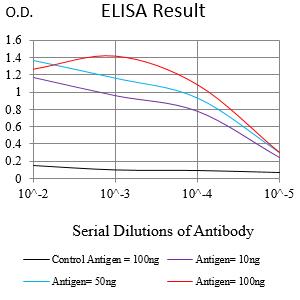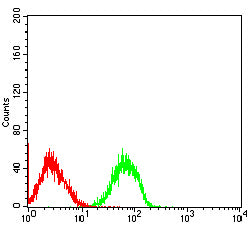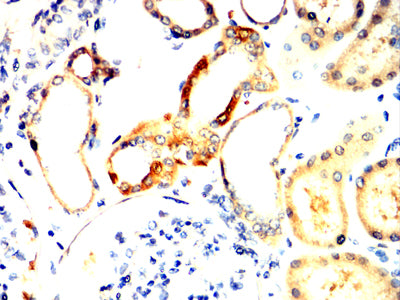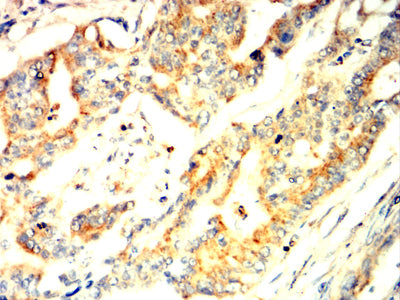




| WB | 咨询技术 | Human,Mouse,Rat |
| IF | 咨询技术 | Human,Mouse,Rat |
| IHC | 1/200 - 1/1000 | Human,Mouse,Rat |
| ICC | 1/50 - 1/200 | Human,Mouse,Rat |
| FCM | 1/200 - 1/400 | Human,Mouse,Rat |
| Elisa | 1/10000 | Human,Mouse,Rat |
| Aliases | SMPR; MPR46; CD-MPR; MPR 46; MPR-46; CD-M6PR |
| Entrez GeneID | 4074 |
| clone | 6G11E7 |
| WB Predicted band size | 31kDa |
| Host/Isotype | Mouse IgG1 |
| Antibody Type | Primary antibody |
| Storage | Store at 4°C short term. Aliquot and store at -20°C long term. Avoid freeze/thaw cycles. |
| Species Reactivity | Human |
| Immunogen | Purified recombinant fragment of human M6PR (AA: 27-277) expressed in E. Coli. |
| Formulation | Purified antibody in PBS with 0.05% sodium azide |
+ +
以下是关于M6PR抗体的3篇参考文献及其摘要概括:
---
1. **文献名称**:*The Mannose 6-Phosphate Receptor and the Biogenesis of Lysosomes*
**作者**:Braulke T, Bonifacino JS
**摘要**:该综述详细探讨了M6PR在溶酶体酶分选和运输中的核心作用,并描述了针对该受体的抗体在研究其亚细胞定位及功能调控中的应用,例如通过免疫荧光和免疫印迹追踪受体动态。
2. **文献名称**:*Role of the Mannose-6-Phosphate/Insulin-like Growth Factor II Receptor in Cancer*
**作者**:Killian JK, et al.
**摘要**:研究分析了M6PR在肿瘤中的表达缺失与其抑癌功能的关系,利用特异性抗体检测发现多种癌症中M6PR表达下调,提示其作为潜在生物标志物的价值。
3. **文献名称**:*M6PR-mediated lysosomal enzyme trafficking in neuronal health and disease*
**作者**:Qian Y, et al.
**摘要**:本文通过M6PR抗体研究神经元中溶酶体酶运输机制,发现M6PR功能障碍与阿尔茨海默病等神经退行性疾病相关,为病理机制提供了新见解。
---
以上文献均通过M6PR抗体揭示了受体在生理及病理过程中的作用,涵盖基础机制到疾病应用研究。
The mannose-6-phosphate receptor (M6PR) is a transmembrane glycoprotein critical for lysosomal enzyme trafficking and biogenesis. It recognizes mannose-6-phosphate (M6P) tags on newly synthesized hydrolases in the Golgi apparatus, directing their transport to lysosomes via clathrin-coated vesicles. Two forms exist: the cation-independent M6PR (CI-M6PR), which also binds IGF-II, and the smaller cation-dependent M6PR (CD-M6PR). Dysregulation of M6PR is linked to lysosomal storage disorders (e.g., I-cell disease) and cancer, where altered receptor expression may influence tumor progression or metastasis.
M6PR antibodies are essential tools for studying these processes. They enable detection and localization of M6PR in cells or tissues using techniques like Western blotting, immunofluorescence, and immunohistochemistry. Researchers employ these antibodies to investigate receptor distribution under physiological conditions, during lysosomal stress, or in disease models. In cancer research, M6PR antibodies help assess receptor expression levels, which may correlate with prognosis or therapeutic responses. Additionally, they aid in exploring M6PR's role in autophagy, endosomal sorting, and cross-talk with signaling pathways like IGF or mTOR. Commercial M6PR antibodies are typically raised against epitopes in the extracellular or cytoplasmic domains, with validation across species (human, mouse, rat) to support diverse experimental applications.
×